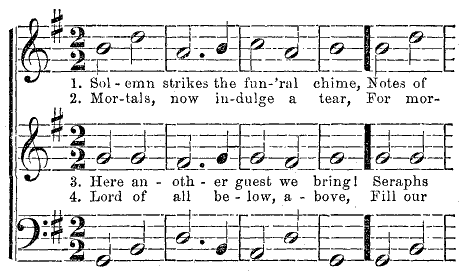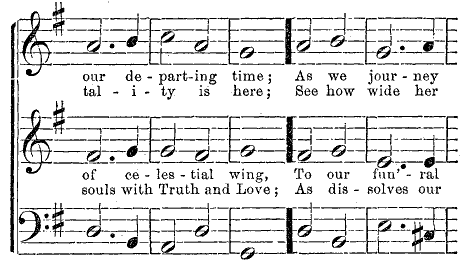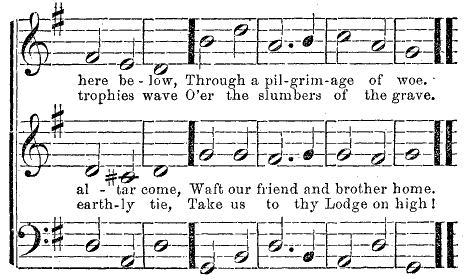|
Remarks On The Third
Degree
CHAPTER X
FREEMASON'S MONITOR
Thomas Smith Webb
From this class the rulers of regular bodies of Masons, in the first
three degrees, are selected, as it is only from those who are capable of
giving instruction that we can properly expect to receive it. The lecture
of this degree, considered separately from the duties and ceremonies
appertaining to the degree of Presiding or Past Master, is divided into
three sections.
The First Section.
The ceremony of initiation into the third degree is particularly
specified in this branch of the lecture, and here many other useful
instructions are given.
Such is the importance of this section, that we may safely declare,
that the person who is unacquainted with it is ill qualified to act as a
ruler or governor of the work.
SCRIPTURE.
The following passage of Scripture is introduced during the
ceremonies:
Remember now thy Creator in the days of thy youth, while the evil
days come not, nor the years draw nigh, when thou shalt say, I have no
pleasure in them; while the sun, or the light, or the moon, or the
stars, be not darkened, nor the clouds return. after the rain: in the
day when the keepers of the house shall tremble, and the strong men
shall bow themselves, and the grinders cease because they are few, and
those that look out of the windows be darkened, and the doors shall be
shut in the streets, when the sound of the grinding is low; and he shall
rise up at the voice of the bird, and all the daughters of music shall
be brought low. Also when they shall be afraid of that which is high;
and fears shall be in the way, and the almond-tree shall flourish, and
the grasshopper shall be a burden, and desire shall fail: because man
goeth to his long home, and the mourners go about the streets: or ever
the silver cord be loosed, or the golden bowl be broken, or the pitcher
be broken at the fountain, or the wheel broken at the cistern. Then
shall the dust return to the earth as it was, and the spirit shall
return unto God who gave it. - Eccles.-xii: 1-7.
THE WORKING TOOLS
Of a Master Mason, which are illustrated in this section, are all the
implements of Masonry indiscriminately, but more especially
THE TROWEL.
The TROWEL is an instrument made use of by operative Masons to spread
the cement which unites a building into one common mass; but we, as Free
and Accepted Masons, are taught to make use of it
for the more noble and glorious purpose of spreading the cement of
brotherly love and affection; that cement which unites us into
one sacred band, or society of friends and brothers, among whom no
contention should ever exist, but that noble contention, or rather
emulation, of who best can work or best agree.
The Second Section
Recites the historical traditions of the Order, and presents to view a
finished picture of the utmost consequence to the Fraternity. It
exemplifies an instance of virtue, fortitude, and integrity, seldom
equaled, and never excelled, in the history of
man.
FUNERAL DIRGE.



PRAYER,
At Raising a Brother to the Sublime Degree of a Master
Mason.
THOU, O God! knowest our down-sitting and our uprising, and
understandest our thoughts afar off. Shield and defend us fromn the evil
intentions of our enemies, and support us under the trials and
afflictions we are destined to endure while traveling through this vale
of tears. Man that is born of a woman is of few days, and full of
trouble. He cometh forth as a flower, and is cut down; he fleeth also as
a shadow, and continueth not. Seeing his days are determined, the number
of his months are with thee, thou hast appointed his bounds that he can
not pass; turn from him that he may rest, till he shall accomplish his
day. For there is hope of a tree, if it be cut down, that it will sprout
again, and that the tender branch thereof will not cease. But man dieth,
and wasteth away: yea, man giveth up the ghost, and where is he? As the
waters fail from the sea, and the flood decayeth and
drieth up, so man lieth down, and riseth not till the heavens shall be no
more. Yet, O Lord! have compassion on the children of thy creation,
administer them comfort in time of trouble, and save them with an
everlasting salvation. Amen. So mote it be.
The Third Section
Illustrates certain hieroglyphical emblems, and inculcates many
useful lessons to extend knowledge and promote virtue.
In this branch of the lecture many particulars relative to King
Solomon's Temple are considered.
The construction of this grand edifice was attended with two
remarkable circumstances. From tradition we learn that although seven
years were occupied in building it, yet during the whole term it rained
not in the day-time, that the workmen might not be obstructed in their
labor: and from sacred history it appears that there was neither the
sound of the hammer, nor ax, nor any tool of iron, heard in the house
while it was
building.
This famous fabric was supported by fourteen hundred and fifty-three
columns, and two thousand nine hundred and six pilasters, all hewn from
the finest Parian marble. There were employed in this building three
grand masters; three thousand and three hundred masters, or overseers of
the work; eighty thousand fellow-crafts; and seventy thousand entered
apprentices, or bearers of burdens. All these were classed and arranged
in such a manner by the wisdom of Solomon, that neither envy, discord,
nor confusion were suffered to interrupt that universal peace and
tranquillity which pervaded the world at this important period.
THE THREE STEPS
Usually delineated upon the Master's carpet are emblematical of the
three principal stages of human life, viz., youth, manhood, and age. In
youth, as entered apprentices, we ought industriously to occupy our
minds in the attainment of useful knowledge: in manhood, as
fellow crafts, we should apply our knowledge to the discharge of our
respective duties to God, our neighbors, and ourselves; that so in age,
as Master Masons, we may enjoy the happy reflections consequent on a
well spent life, and die in the hope of a glorious immortality.
THE POT OF INCENSE
Is an emblem of a pure heart, which is always an acceptable sacrifice
to the Deity; and, as this glows with fervent heat, so should our hearts
continually glow with gratitude to the great and beneficent Author of
our existence, for the manifold blessings and comforts we enjoy.
THE BEE-HIVE
Is an emblem of industry, and recommends the practice of that virtue
to all created beings, from the highest seraph in heaven to the lowest
reptile of the dust. It teaches us that, as we came into the world
rational and intelligent beings, so we should ever be industrious
ones; never sitting down contented while our fellow-creatures around us are
in want, when it is in our power to relieve them, without inconvenience
to ourselves.
When we take a survey of nature, we view man, in his infancy, more
helpless and indigent than the brutal creation; he lies languishing for
days, months, and years, totally incapable of providing sustenance for
himself, of guarding against the attacks of the wild beasts of the
field, or sheltering himself from the inclemencies of the weather.
It might have pleased the great Creator of heaven and earth to have
made man independent of all other beings; but, as dependence is one of
the strongest bonds of society, mankind were made dependent on each
other for protection and security, as they thereby enjoy better
opportunities of fulfilling the duties of reciprocal love and
friendship. Thus was man formed for social and active life, the noblest
part of the work of God; and he that will so demean himself as not to be
endeavoring to add to the common stock of knowledge and understanding, may be
deemed a drone in the hive of nature, a useless member of
society, and unworthy of our protection as Masons.
THE BOOK OF CONSTITUTIONS,
Guarded by the Tyler's Sword,
Reminds us that we should be ever watchful and guarded in our
thoughts, words, and actions, particularly when before the enemies of
Masonry, ever bearing in remembrance those truly Masonic virtues,
silence and circumspection.
THE SWORD,
Pointing to a Naked Heart,
Demonstrates that justice will sooner or later overtake us; and,
although our thoughts, words, and actions may be hidden from the eyes of
man, yet that
ALL-SEEING EYE,
Whom the SUN, MOON, and STARS obey, and under whose watchful care
even comets perform their stupendous revolutions, pervades the inmost
recesses of the human heart, and will reward us according to our
merits.
THE ANCHor AND ARK
Are emblems of a well-grounded hope and a well-spent life.
They are emblematical of that Divine ark which safely wafts us
over this tempestuous sea of troubles, and that anchor which
shall safely moor us in a peaceful harbor, where the wicked cease from
troubling, and the weary shall find rest.
THE FORTY-SEVENTH PROBLEM OF EUCLID.*)
This was an invention of our ancient friend and brother, the great
Pythagoras, who, in his travels through Asia, Africa, and Europe, was
initiated into several orders of priesthood, and raised to the sublime
degree of a Master Mason. This wise philosopher enriched his mind abundantly in a general knowledge
of things, and more especially in geometry or Masonry. On this subject
he drew out many problems and theorems; and among the most distinguished
he erected this, which, in the joy of his heart, he called
Eureka, in the Grecian language, signifying I have found
it; and upon the discovery of which he is said to have sacrificed a
hecatomb. It teaches Masons to be general lovers of the arts and
sciences.
*) THEOREM. - In any right-angled triangle, the square which is
described upon the side subtending the right angle is equal to the squares
described upon the sides which contain the right angle. - Euclid, lib.
i, prop. 47.
THE HOUR-GLASS
Is an emblem of human life. Behold! how swiftly the sands run, and
how rapidly our lives are drawing to a close! We can not without
astonishment behold the little particles which are contained in this
machine, how they pass away almost imperceptibly, and yet, to our
surprise, in the short space of an hour, they are all exhausted. Thus
wastes man! To-day he puts forth the tender leaves of hope; to-morrow
blossoms, and bears his blushing honors thick upon him; the next day comes a frost, which nips the
shoot, and when he thinks his greatness is still aspiring, he falls like
autumn leaves, to enrich our mother earth.
THE SCYTHE
Is an emblem of Time, which cuts the brittle thread of life, and
launches us into eternity. Behold! what havoc the scythe of Time makes
among the human race! If by chance we should escape the numerous evils
incident to childhood and youth, and with health and vigor arrive to the
years of manhood, yet withal we must soon be cut down by the
all-devouring scythe of Time, and be gathered into the land where our
fathers have gone before us.
SETTING MAUL.
SPADE.
COFFIN.
EVERGREEN.
Here usually follows an exhortation to the practice of virtue. The
following is a form much used.
NOW, Brethren, let us see to it, and so regulate our lives by the
plumb-line of justice, ever squaring our actions by the
rule of virtue, that when the Grand Warden of Heaven shall call for us
we may be found ready. Let us cultivate assiduously the noble tenets of
our profession, Brotherly Love, Relief, and Truth; and
from the Square learn morality; from the Level, equality; and from the
Plumb, rectitude of life. Let us imitate, in all his varied perfections,
him let us emulate his amiable and virtuous conduct, his unfeigned piety
to his God, and his inflexible fidelity to his trust. As the evergreen
which bloomed at the head of his grave betrayed the place of Warren's
interment, so may virtue, by its everblooming loveliness, designate
us as Free and Accepted Masons.
With the Trowel spread liberally the cement of brotherly love and
affection, circumscribed by the Compass; let us ponder well our words and
actions, and let all the energies of our minds and the affections of our
souls be employed in the attainment of our Supreme Grand Master's
approbation; then when our dissolution draws nigh, and the cold winds of
death come sighing around us, and his chill dew already glistens on our
brow, with joy shall we obey the summons of the Grand Warden of Heaven,
and go from our labors on earth to everlasting refreshment in the
Paradise of God; then by the benefit of a pass, a pure and blameless
life, with a firm reliance on Divine Providence, shall we gain ready
admission into that Celestial Lodge above, where the Supreme Architect
of the Universe presides: where, seated at the right hand of our Supreme
Grand Master, he will be pleased to pronounce us just and upright
Masons; then shall we be fitly prepared as living stones for that
spiritual building, that house not made with hands, eternal in the
heavens; where no discordant voice shall be heard, but
all the soul shall experience shall be perfect bliss, and all it shall
express shall be perfect praise, and love divine shall ennoble every
heart, and hosannas exalted employ every tongue.
CHARGE
At Initiation into the Third Degree.
BROTHER: Your zeal for the institution of Masonry, the progress you
have made in the mystery, and your conformity to our regulations, have
pointed you out as a proper object of our favor and esteem.
You are now bound, by duty, honor, and gratitude, to be faithful to
your trust; to support the dignity of your character on every occasion;
and to enforce, by precept and example, obedience to the tenets of the
Order.
In the character of a Master Mason you are authorized to correct the
errors and irregularities of your uninformed brethren, and to guard them
against a breach of fidelity. To preserve the reputation of the Fraternity unsullied must be your constant care; and for this
purpose it is your province to recommend to your inferiors obedience and
submission; to your equals, courtesy and affability; to your superiors,
kindness and condescension. Universal benevolence you are always to
inculcate; and, by the regularity of your own behavior, afford the best
example for the conduct of others less informed. The ancient landmarks
of the Order intrusted to your care you are carefully to preserve, and
never suffer them to be infringed, or countenance a deviation from the
established usages and customs of the Fraternity.
Your virtue, honor, and reputation are concerned in supporting with
dignity the character you now bear. Let no motive, therefore, make you
swerve from your duty, violate your vows, or betray your trust; but be
true and faithful, and imitate the example of that celebrated Artist
whom you this evening represent. Thus you will render yourself deserving
of the honor which we have conferred, and merit the confidence that we
have
reposed.
back to top |
![]()








